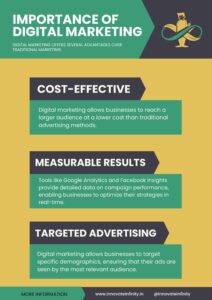Digital marketing refers to the use of digital channels, such as search engines, social media, email, and websites, to promote products or services. It has evolved significantly over the past decade, driven by advancements in technology and changes in consumer behavior. In today’s marketplace, digital marketing is essential for reaching a broad audience and achieving measurable business results.
Importance of Digital Marketing
Digital marketing offers several advantages over traditional marketing:
- Cost-Effective: Digital marketing allows businesses to reach a larger audience at a lower cost than traditional advertising methods.
- Measurable Results: Tools like Google Analytics and Facebook Insights provide detailed data on campaign performance, enabling businesses to optimize their strategies in real-time.
- Targeted Advertising: Digital marketing allows businesses to target specific demographics, ensuring that their ads are seen by the most relevant audience.
According to a recent study, businesses that prioritize digital marketing are 2.8 times more likely to see revenue growth.

Components of Digital Marketing
Digital marketing comprises several key components, each serving a unique purpose in a comprehensive marketing strategy:
SEO (Search Engine Optimization)
SEO involves optimizing your website to rank higher in search engine results, thereby increasing organic traffic. Key strategies include:
- Keyword Optimization: Identifying and using relevant keywords that your target audience is searching for.
- Content Quality: Creating high-quality, valuable content that answers user queries.
- Technical SEO: Ensuring that your website is technically sound, with fast loading times and mobile-friendly design.
Content Marketing
Content marketing is the practice of creating and distributing valuable content to attract and engage your audience. This can include:
- Blog Posts: Regularly updated articles that provide insights and information on industry topics.
- Videos: Engaging video content that explains products or services, tells brand stories, or entertains.
- Infographics: Visually appealing graphics that convey data or concepts in an easy-to-understand format.
Content marketing is crucial for establishing brand authority and building trust with your audience.
Social Media Marketing
Social media marketing involves using platforms like Facebook, Instagram, and LinkedIn to promote your products and engage with customers. Effective strategies include:
- Consistent Posting: Regular updates to keep your audience engaged.
- Interactive Content: Polls, quizzes, and live videos that encourage user participation.
- Analyzing Metrics: Tracking likes, shares, and comments to gauge engagement and refine your approach.
Email Marketing
Email marketing is a direct channel to communicate with potential and current customers. Best practices include:
- Segmentation: Dividing your email list into segments based on behavior or demographics for more targeted messaging.
- Personalization: Tailoring emails to individual recipients to increase engagement.
- Automation Tools: Using platforms like Mailchimp or HubSpot to automate and manage email campaigns.
PPC (Pay-Per-Click Advertising)
PPC is a model where advertisers pay each time their ad is clicked. Common platforms include Google Ads and Facebook Ads. Key aspects include:
- Keyword Research: Identifying the right keywords to bid on.
- Ad Copy: Crafting compelling ad copy that drives clicks.
- Budget Management: Allocating your budget effectively to maximize ROI.
Digital Marketing Analytics
Analytics is vital for understanding the effectiveness of your digital marketing efforts. Key metrics to track include:
- Conversion Rate: The percentage of visitors who complete a desired action.
- Click-Through Rate (CTR): The ratio of users who click on a link to the number of total users who view it.
- Return on Investment (ROI): The revenue generated from digital marketing activities relative to their cost.
Tools like Google Analytics, SEMrush, and Moz provide detailed insights into your campaigns, helping you make data-driven decisions.
Challenges in Digital Marketing
Common challenges in digital marketing include:
- Competition: The digital landscape is crowded, making it difficult to stand out.
- Keeping Up with Trends: Technology and consumer preferences change rapidly, requiring continuous adaptation.
- Budget Constraints: Smaller businesses may struggle to compete with larger companies in terms of marketing spend.
Future Trends in Digital Marketing
Emerging trends that will shape the future of digital marketing include:
- AI and Automation: Tools that automate tasks and provide personalized experiences at scale.
- Personalization: Tailoring marketing messages to individual preferences.
- Voice Search Optimization: Adapting content to be easily found through voice searches, which are becoming more common.
FAQs
What are the main types of digital marketing?
The main types include SEO, content marketing, social media marketing, email marketing, and PPC advertising.
How can small businesses benefit from digital marketing?
Small businesses can reach a wider audience at a lower cost, compete with larger companies, and build brand awareness effectively.
What is the ROI of digital marketing?
The ROI for digital marketing can be significant, as it allows for precise tracking of campaigns and measurable results.
Conclusion
Digital marketing is a powerful tool for businesses of all sizes. By understanding its components and leveraging the right strategies, you can effectively reach your target audience, drive engagement, and achieve your business goals.

